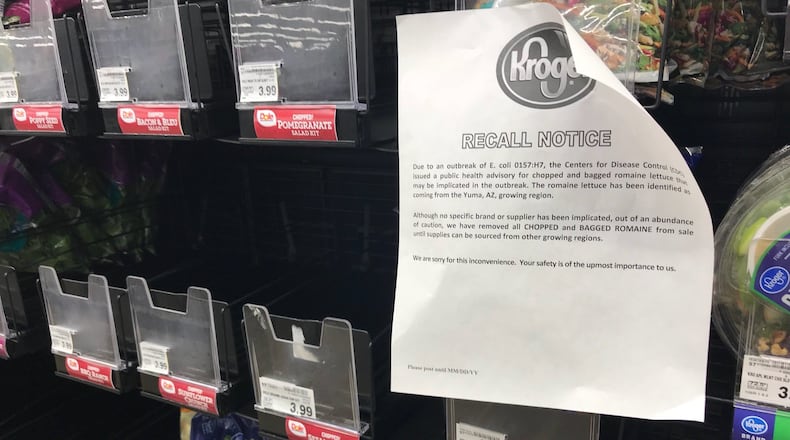RELATED: Dayton health center getting new home, new name
However, no grower, supplier, distributor, or brand has been identified as a source of the 11-state outbreak that’s left 35 people ill including two Ohio women.
Wal-Mart, Kroger and Meijer were among grocery chains that pulled all products that may contain chopped romaine lettuce from that region.
“We have no reports of any issues with romaine lettuce sold at Meijer in recent weeks and we are simply removing these lettuce products out of an abundance of caution,” a Meijer spokeswoman stated.
RELATED: See how many people in your county bought Obamacare insurance
Likewise, a Wal-Mart spokeswoman said “Out of an abundance of caution, and in accordance with the CDC Advisory, all products which may contain chopped romaine lettuce from the Yuma, AZ area have been removed from our shelves.”
Kroger also removed bagged salad items that contain romaine.
“As part of Kroger’s commitment to food safety, we proactively reach out to customers by phone, email and at the register if they are flagged as a person who has previously purchased this product,” a spokeswoman stated.
Symptoms of an E. coli infection vary but often include severe stomach cramps and (often bloody) diarrhea. Most people get better in five to seven days. Infections can be mild but can also be severe or life-threatening.
If you think you have E. coli, the CDC advises you to speak with your health care provider or public health department and write down what you ate in the week before you get sick.
RELATED: Another Ohio woman sick from E. coli outbreak
The outbreak strain as of April 13 had spread to 11 states there have been 22 people hospitalized, including one of the two Ohio women.
Both Ohio cases were reported by 24-year-old women from Mahoning County. The onset of the first case was March 24 and onset the second case was March 26.
To reduce your risk of an E. coli infection, you can:
- Wash your hands. Wash hands after using the restroom or changing diapers, before and after preparing or eating food, and after contact with animals.
- Cook meats thoroughly to kill harmful germs.
- Thoroughly wash hands, counters, cutting boards, and utensils after they touch raw meat.
- Wash fruits and vegetables before eating.
- Avoid raw milk, other unpasteurized dairy products, and unpasteurized juices.
- Don't prepare food or drink for others when you are sick.
About the Author
